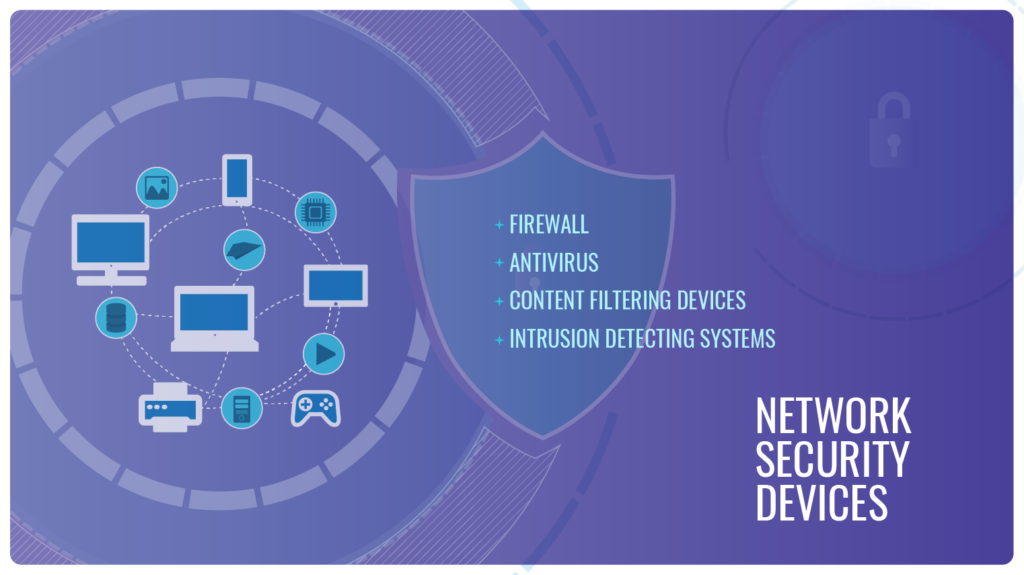
In a previous blog, we explored various concepts associated with network security. If you haven’t already, we highly recommend reading that blog first, as it will give you a basic understanding of network security before you can then dive into the network security devices. If you have gone through it, read ahead to know the types of network security devices that exist in the market today, and the types of security threats each one can tackle.
Firewalls
Firewalls are network security devices that monitor and ‘curate’ network traffic based on a rigid set of rules. A firewall establishes a protective wall between your internal private network and the global internet.
As we’ll see soon enough, firewalls can be both software applications and hardware devices. Hardware firewalls can serve multiple purposes along with network protection, like dynamically assigning identifying IP addresses to devices present in the network.
Firewalls are used at the ‘boundary’ of a private network to prevent unauthorized access via the internet. All inbound and outbound messages are scanned by the firewall before they can leave or enter the private network. During the scan, the firewall passes the message (also called as network packet) through a security checklist, which is basically a list of rules that qualify a message as safe. Only if a message checks all the boxes, is it allowed to travel forward.
Hardware Firewalls
A hardware firewall is a standalone product. They’re connected to devices in the network via ports, of which any given firewall has at least four. Large-scale organizations can opt for higher-end firewall devices with several more ports and advanced security mechanisms.
Software Firewalls
Software firewalls are programs that you install on your computer. They have configurable options which help you setup your firewall for maximum security. The software monitors all network packets that you upload / download via the internet.
Reading resources: Why a Web Application Firewall is a must in your security arsenal.
Antivirus
An antivirus is a software program that can detect and remove malware and other threatening software programs.
Initially, antivirus programs could combat just viruses. But now, they provide security against worms, Trojans, ransomware and spywares, etc. Some antivirus solutions can also prevent phishing attempts that try to enter via email. Ideally, your network security devices / tools should catch security threats penetrating from any source, and that includes malicious programs as well as malware from the email.
Content Filtering Devices
Content filtering devices are used to filter out potentially threatening and offensive online content. This includes incoming emails, constant spam, and even websites. As the name suggests, such devices scans the content of online content and verifies its safety by passing it through its own blacklist of words. Some CFDs can also store well-known spam sites and email domains and warn you ahead of time before you interact with them.
These devices throw an “Access Denied” error when anyone tries to access unverified, possibly malicious content.
The basic configuration of this network security device blocks pornographic or hateful content. But besides, your organization can also block out product selling spam and unwanted newsletters.
Intrusion Detection Systems
Intrusion Detection Systems, often also called Intrusion Detection and Prevention Systems, are devices that monitor malicious activities in a network, create a log of such activities, and if a part of their feature set, take steps to stop them. At the very least, an IDS will provide you with insightful reports about your network activity. Using these reports, you can take actions to better your network security.
Active intrusion detection systems (the IDPSs) help in raising alarms if malicious network packets attempt to harm your network, forcefully drop the packets, and reset the network channel connection to prevent your network from blocking all subsequent, valid network traffic. If you’re looking for a security partner that can manage your network security devices and squeeze maximum security from them, look no further.
Logix provides network security via its firewalls and endpoint security services to protect your devices. We have partnered up with front-runners of network security, like Cisco, Sophos, Fortinet, Trend Micro, and McAfee to provide secure network connections to remote devices.